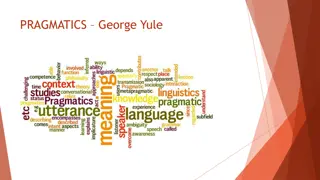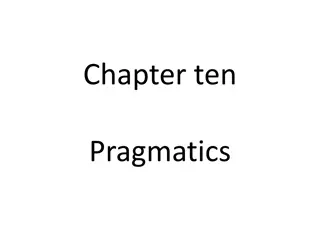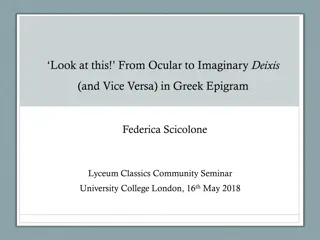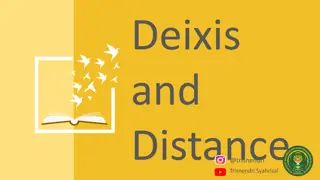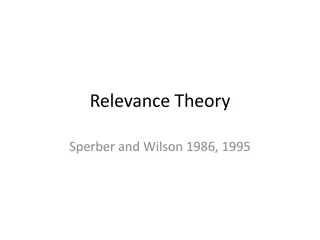Pragmatics in Linguistics Studies
Pragmatics delves into the study of implied meanings and how we interpret language in various contexts. It focuses on understanding communication beyond explicit words and explores the invisible meanings conveyed through situational and linguistic contexts. Deixis, physical context, and linguistic c
2 views • 41 slides
Overview of Pragmatics and Deixis According to George Yule
Pragmatics and Deixis are crucial aspects of language understanding, as explored by George Yule. Pragmatics focuses on the use of language in context, while Deixis involves pointing via language to convey meaning based on the immediate context. Deictic expressions play a significant role in face-to-
0 views • 19 slides
Reference and Inference in Linguistics
Discussing deixis, the act of reference in language is explained as a way for speakers and writers to enable listeners and readers to identify entities. Reference involves using proper nouns, phrases, pronouns, and even invented names. Inference plays a crucial role in successful acts of reference,
0 views • 11 slides
Pragmatics in Communication
Pragmatics in communication involves recognizing not just the literal meaning of words, but also understanding the speaker's intentions and context. It delves into invisible meanings, shared assumptions, and expectations that shape communication. This includes linguistic and physical context, deixis
0 views • 13 slides
Ocular to Imaginary Deixis in Greek Epigram
The seminar held at University College London on 16th May 2018 explored the transition from ocular to imaginary deixis in Greek epigrams. It delved into the significance of visual elements in ancient artifacts and inscriptions, shedding light on the evolution of contextual meanings within Greek art
0 views • 8 slides
Deixis: Pointing via Language
Deixis is a fundamental aspect of language that involves pointing via linguistic expressions to locate subjects in various contexts such as spatial, temporal, social, and discoursal situations. It is a crucial element that reflects the relationship between language and context. Through deictic expre
0 views • 34 slides
Relevance Theory: Sperber and Wilson's Approach
Relevance Theory, introduced by Sperber and Wilson in 1986, aims to explain how propositions are understood without relying on mutual knowledge. It addresses deixis, ellipsis, vagueness, and ambiguity while exploring implicatures and providing a general theory of communication beyond just verbal int
0 views • 38 slides
Reference and deixis
Reference and deixis are fundamental aspects of language, focusing on how language designates entities in the world and its relation to communication. Explore types of reference like definite, indefinite, and generic, along with different types of deixis such as person, spatial, temporal, social, an
0 views • 19 slides

